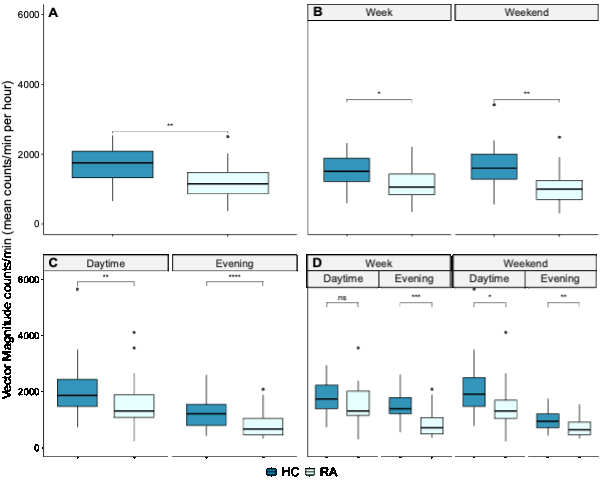Session Information
Date: Monday, October 27, 2025
Title: (1306–1346) Rheumatoid Arthritis – Diagnosis, Manifestations, and Outcomes Poster II
Session Type: Poster Session B
Session Time: 10:30AM-12:30PM
Background/Purpose: People with rheumatoid arthritis (pwRA) are prone to fall short of the World Health Organization’s physical activity (PA) recommendations due to perceived fatigue and pain. Given the high prevalence of fatigue and its impact on health-related quality of life and social participation, this study investigated objectively measured PA patterns and the association between PA and self-reported fatigue in pwRA compared to healthy controls (HC).
Methods: In this observational cross-sectional study, pwRA (DAS28 > 2.6) and HC wore a tri-axial accelerometer (ActiGraph wGT3X-BT, ActiGraph LLC) on one ankle for ≥4 days. Accelerometer-based outcomes included vector magnitude counts/min (square root of summed sagittal, frontal, and vertical axes’ counts/min squared – primary outcome), step count, and time spent in moderate-to-vigorous intensity PA. Data were separated by day and time (weekday/weekend; daytime/evening) to investigate PA patterns. Fatigue severity was assessed using the Fatigue Severity Scale (FSS, 0–7). Associations between fatigue, RA status, and PA were examined using multilevel generalized estimating equations models (patient and day-timing as levels). Interactions between RA and fatigue were tested. Manual forward selection identified multivariable associations adjusted for confounders.
Results: Participants included 23 pwRA (20 females, age 52 (SD 13), FSS 4.7 (1.4)) and 18 HC (14 females, age 52 (11), FSS 2.1 (1.0)). Vector magnitude counts/min were lower in pwRA than HC at any time, with non-significant differences on weekday daytime (1534.3 (691.3) in pwRA vs 1802.6 (610.6) in HC), and larger differences on weekday evenings (880.7 (491.4) vs 1457.3 (572.7)) (Figure 1). Step count was also lower in pwRA (587 (226) vs 724 (224) steps/h), as was time spent in moderate-to-vigorous PA (1.6 (1.4) vs 2.7 (1.5) min/h). No interaction was found between fatigue and RA, indicating that fatigue affected PA similarly in both groups. Likewise, no interaction between group and day-timing was observed, suggesting comparable daily PA patterns in pwRA and HC. RA was significantly and negatively associated with vector magnitude counts/min after adjusting for confounders (β = -330.63; 95% CI = -650.45 to -10.81; Table 1). In the multivariable model, lower vector magnitude counts/min was seen in pwRA, persons with higher fatigue severity (β = -43.89; 95% CI = -135.26 to 47.48), and in persons with higher BMI (β = -27.18; 95% CI = -50.73 to -3.62). BMI, RA presence, and fatigue were similarly negatively associated with step count and time spent in moderate-to-vigorous PA.
Conclusion: pwRA performed less objectively measured PA than HC. Fatigue was inversely associated with PA, with no differential impact between groups. Future research should examine the role of transient vs persistent fatigue, employability, inflammation, and medication use in PA participation. This may identify which patients are most at risk of falling short of PA guidelines and help design effective interventions.
 Figure 1: Vector Magnitude counts per minute (mean counts/min per hour) measured in rheumatoid arthritis patients (RA) and healthy controls (HC) overall (A), on weekdays as compared to the weekend (B), during the day and during the evening (C), and separated by day as well as timing of the day (D). ns p > .05, * p < .05, ** p < .01, *** p < .001, **** p < .0001
Figure 1: Vector Magnitude counts per minute (mean counts/min per hour) measured in rheumatoid arthritis patients (RA) and healthy controls (HC) overall (A), on weekdays as compared to the weekend (B), during the day and during the evening (C), and separated by day as well as timing of the day (D). ns p > .05, * p < .05, ** p < .01, *** p < .001, **** p < .0001
To cite this abstract in AMA style:
Cox M, Theunissen K, Meijer K, Timmermans A, Ramiro S, Boonen A, Plasqui G. Similar Negative Effects of Fatigue on Physical Activity in Persons with Rheumatoid Arthritis and Healthy Controls: A Patient-Control Study [abstract]. Arthritis Rheumatol. 2025; 77 (suppl 9). https://acrabstracts.org/abstract/similar-negative-effects-of-fatigue-on-physical-activity-in-persons-with-rheumatoid-arthritis-and-healthy-controls-a-patient-control-study/. Accessed .« Back to ACR Convergence 2025
ACR Meeting Abstracts - https://acrabstracts.org/abstract/similar-negative-effects-of-fatigue-on-physical-activity-in-persons-with-rheumatoid-arthritis-and-healthy-controls-a-patient-control-study/

.gif)